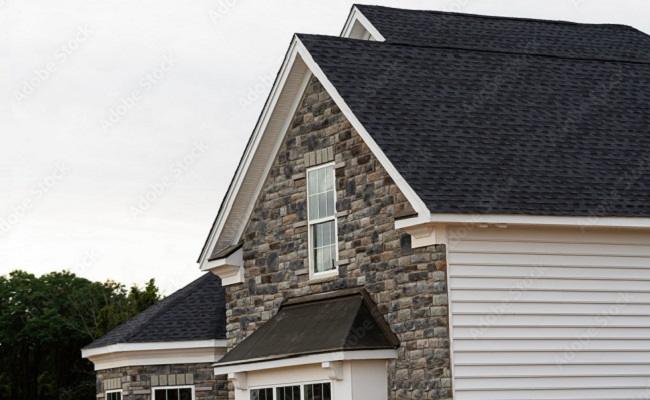Asphalt shingle roofs are a mainstay for countless houses across the country. They’re a popular pick for good reason: they’re affordable, easy to install, and come in a wide variety of styles and colors.
But like any home improvement project, an asphalt roof isn’t built to last forever. Whether you’re thinking about putting on a new roof or wondering how much longer your current one will hold up, knowing the lifespan of asphalt shingle roofing is important.
Several factors influence how long your asphalt roof will perform. In this guide, you’ll know various details to make a smart choice that will extend your roof’s life and save you money in the long run.
Types of Asphalt Roofing Shingles
Before considering shingle roof replacement in Madison Wisconsin, there are three primary kinds of asphalt roof shingles: 3-tab strip shingles, architectural shingles, and luxury shingles. Each type offers varying levels of durability and lifespan.
3-Tab Strip Shingles
Compared to other options, a 3-tab strip shingle roofing is the most affordable and basic options. This shingle type is also typically one layer thick and have a flat, rectangular shape. While budget-friendly, 3-tab shingles offer the shortest lifespan, lasting around 15-20 years.
Architectural Shingles
Architectural shingles, sometimes called dimensional shingles, boast a layered construction that creates a thicker profile and richer texture compared to flat, 3-tab shingles. This added dimension provides better wind resistance and a more aesthetically pleasing appearance. Architectural shingles generally last 20-25 years.
Luxury Shingles
As the name suggests, these roof shingles are the most premium and longest-lasting option. They often mimic the look of slate or wood shakes and come with enhanced wind and impact resistance. Luxury shingles can last upwards of 30 years or even longer with proper care.
Choosing the right residential roof for your house is all about finding the balance between how long it lasts, how it looks, and how much it costs. From super strong shingles that can stand up to anything to beautiful styles that make your house the envy of the block, there are tons of options to pick from. And the best part? If you choose wisely and get a pro to install it, a new roof can keep your home safe and looking sharp for years to come.
Key Factors Affecting Asphalt Roof’s Longevity
The longevity of asphalt shingle roofs isn’t set in stone. Several factors play a crucial role in determining how long your roof will last, impacting both performance and durability.
Quality of Materials
High-quality shingles boast longer lifespans due to their superior materials and construction. They’re better equipped to resist weathering, providing reliable protection against the elements. Opting for premium shingles can mean the difference between a roof that lasts 15 years and one that can go beyond 30 years.
Installation Expertise
The skill with which your roof is installed can significantly affect its longevity. Properly installed roofs boast fewer leaks and structural problems over their lifespan. It’s essential to choose a reputable and experienced roofing contractor who adheres to the best installation practices.
Climate Conditions
Roofs in areas exposed to severe weather conditions, such as hurricanes, hailstorms, or extreme temperature fluctuations, may have a reduced lifespan. Continuous exposure to such harsh conditions can accelerate the aging process of asphalt shingles, making them more susceptible to damage.
Maintenance Matters
Consistent maintenance can ward off many potential problems that shorten a roof’s lifespan. This includes periodic inspections to identify and rectify minor issues before they escalate into significant concerns, ensuring the roof remains in optimal condition for as long as possible.
Ventilation And Insulation
A well-ventilated and insulated attic is crucial for maintaining the temperature balance that asphalt shingles need to perform optimally. Without it, shingles can prematurely deteriorate due to heat and moisture buildup, leading to a host of problems like mold growth and wood rot in the roof structure.
These factors collectively determine how well an asphalt roof stands up over time. Understanding and addressing them can significantly extend your roof’s lifespan, ensuring your home stays protected for years to come.
Extending Your Asphalt Roof’s Lifespan
While asphalt shingles have a finite lifespan, there are steps you can take to maximize their longevity:
Schedule Regular Inspections
Have your roof inspected by a qualified professional at least once a year, or more frequently if you live in a harsh climate.
Perform Preventative Maintenance
Remove debris from your roof regularly, especially after storms. Trim any tree branches that hang over the roof to keep it damage-free.
Address Minor Repairs Promptly
Don’t ignore minor issues like missing shingles or leaks. Addressing them promptly may help avoid bigger problems down the road.
Consider Roof Coatings
In some cases, applying a reflective roof coating can help protect your shingles from sun damage and extend their lifespan.
By adhering to these steps, you can extend the life of your asphalt roof, ensuring it remains durable and protective for years to come.

Signs It’s Time For Replacement
Even the most well-maintained asphalt roof will eventually need to be replaced. Here are some clear signs that your roof is due for an upgrade:
Widespread Shingle Damage
If a significant number of shingles are cracked, curled, or missing, this is a telltale sign that your roof’s protective surface is compromised. Such widespread damage often indicates that the roof is failing to protect your home as effectively as it should.
Leaks and Water Damage
Regular occurrences of leaks, especially after rainstorms, or visible water stains on your ceilings and walls indicate that your roof is no longer performing its primary function. Continuous exposure to moisture can lead to mold growth and structural damage, which may require you to replace your roof.
Sagging Roof Deck
Once your roof deck sags between the rafters or trusses, it’s usually a sign of structural issues. This could be due to prolonged exposure to moisture or the weight of the roof itself being too
much for the structure to bear. A sagging roof deck is a serious concern that typically requires a complete roof replacement to address.
Age of The Roof
Asphalt shingle roofs typically last between 20 to 30 years. If your roof is nearing or has surpassed this age range, it’s wise to start considering a replacement. Aging roofs are more prone to problems and may not offer the same level of protection as a new roof.
Recognizing these signs early can prevent more significant issues down the line. Regular inspections and timely interventions are crucial in managing the health and longevity of your asphalt roof.
Conclusion
Asphalt roofs are a smart choice for homeowners seeking durability and affordability. Keeping with the above factors in mind, along with proper maintenance, can help you get the most out of your roof. Stay vigilant for signs of wear and damage, and never hesitate to consult professionals whenever necessary. With the right care, your asphalt roof can protect your home for decades to come.




























